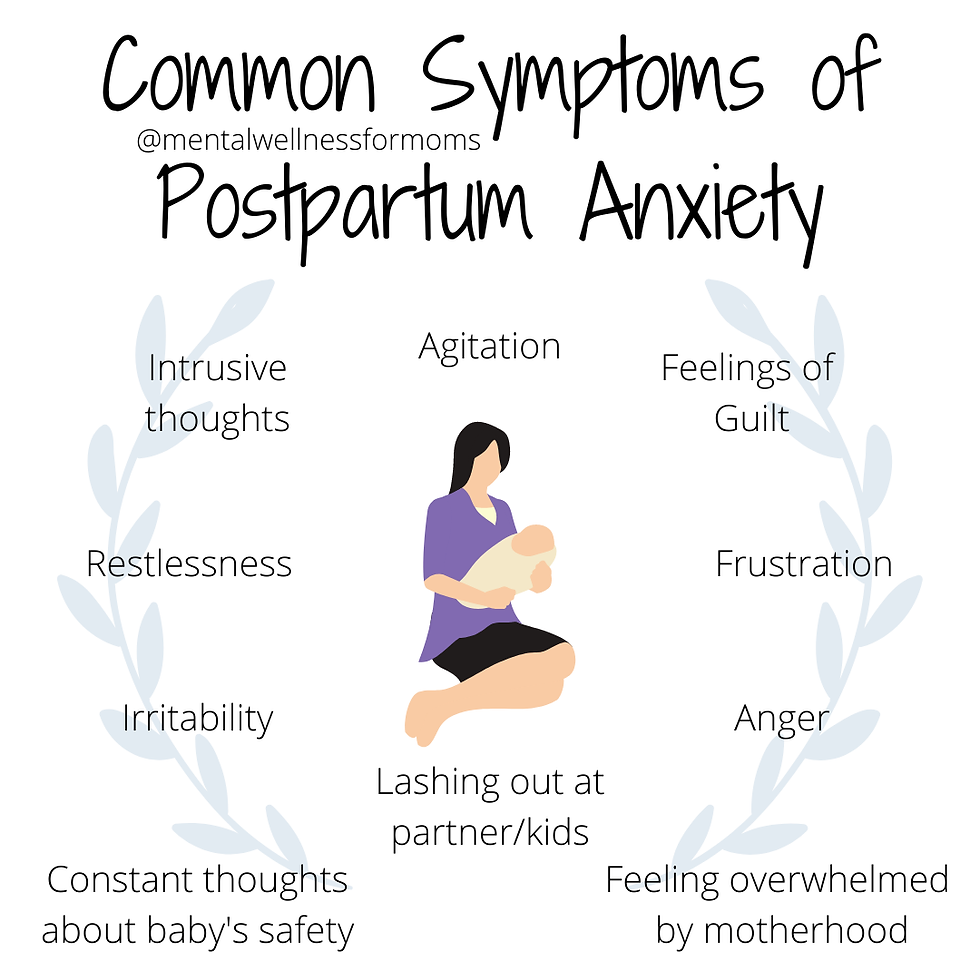Is It Just New Mom Worry—or Postpartum Anxiety? How to Tell and What Can Help Right Now
- Desiree Baird
- Jul 20, 2025
- 4 min read
Updated: Jul 22, 2025

If you’re wondering whether the stress you’re feeling as a new mom might be postpartum anxiety (PPA), I want you to know this: You are not alone—and you deserve support, regardless of whether you’ve been officially diagnosed. Because postpartum anxiety isn’t openly talked about, many women in the thick of it don’t recognize what they’re experiencing. Even though postpartum anxiety is common - affecting at least 1 in 5 new moms - many are left without answers or language for what they’re going through. The silence surrounding maternal mental health creates an extra layer of isolation.
It’s normal to wonder if your level of worry is just part of new motherhood—especially when well-meaning friends, doctors, or other parents dismiss your concerns as “new mom nerves.” This lack of open dialogue often leads women to push down their struggles and try to power through alone— missing out on the kind of support that actually helps.
Maybe you’ve asked yourself, "How do I know if I have postpartum anxiety or just normal new mom stress?" I’ll walk you through what postpartum anxiety really feels like—so you can stop second-guessing yourself.
Common Symptoms of Postpartum Anxiety
If you’ve been Googling things like "what does postpartum anxiety feel like" or "how to know if I have postpartum anxiety," you’ve likely come across lists of common symptoms like excessive worry, restlessness, difficulty sleeping despite exhaustion, and intrusive thoughts. These are a good start - but in my work as a therapist who specializes in postpartum anxiety, I’ve learned that what resonates most is not a checklist—but real, lived experiences.

Here are some common ones I hear from new moms:
Spiraling "what if" thoughts that keep you from sleeping, even when the baby is sleeping
Avoiding visitors because the idea of anyone else holding your baby makes you anxious
Compulsively scrolling for baby health information but never actually feeling reassured
Receiving compliments for "bouncing back" quickly, when in reality you’re too anxious to eat
Being praised for being organized and on top of things— while inside, you're panicked and afraid of messing up
If any of this feels familiar, it may be a sign that what you’re experiencing goes beyond typical new mom worry. The support of a therapist who understands postpartum anxiety can make a world of difference. And while you wait for professional help, there are tools you can use today to help manage anxiety at home— especially if you're looking for ways to reduce anxiety right away.

Tips to Manage Postpartum Anxiety at Home (While You Wait for Support)
You don’t have to wait for a diagnosis to begin feeling better. These simple tools are designed to support your nervous system quickly + to fit into your already busy routine. You can even do them with your baby in your arms.
Sing or Hum to Your Baby
Singing activates the vagus nerve and signals safety to your body. It also soothes your baby, who may be picking up on your anxious energy. I used to sing "You Are My Sunshine" to my son whenever I felt overwhelmed. The melody and the message brought me back to the present moment.
Try this: Hum for 30 seconds. Just one verse of a lullaby. Notice your breath—see if it softens.
Tense and Release
This grounding tool is fast, simple, and powerful. The best part is you can do it anywhere without anyone noticing—even if you're nap-trapped or driving.
Try this: Tense and release each muscle group in your body. As you release, say the word RELAX out loud or in your mind. Start with your feet and work your way up to your face.
Play a Game of Categories
Sometimes distraction is a powerful way to ground ourselves. This tool works by focusing your brain on naming objects within a category in your current environment.
Try this: Choose a category like "colors." Then go through the rainbow—red, orange, yellow, green, blue, purple—and name everything you see in each color like you're making a list.
What to do after using a nervous system regulation skill
Once you've completed a skill, you need to choose to return to the task your anxiety interrupted—or the task you wanted to be doing before anxiety showed up. That step is really, really important. It's the key to success. Want more tools like these? Download Dr. Julie's free printable: Mom Anxiety Coping Cards
When to Get Professional PPA Support and Where to Start
If you think you’re experiencing postpartum anxiety, I encourage you to reach out to a perinatal mental health therapist. Every mom’s experience is different, and therapy can help you feel more like yourself again —even if it turns out your new mom worries don’t meet the threshold for PPA.
If you're in Washington, I offer virtual therapy sessions for postpartum anxiety through my maternal mental health practice, Nurturing the Sisterhood. You can book a free intro call. It's a chance to talk through what's going on, get a feel for what working together might be like, and see if it feels like a good fit.
Dr. Julie Franks, Washington Therapist for Moms
Website: www.nurturingthesisterhood.com
Instagram: @Nurturingthesisterhood

Dr. Julie Franks, DSW, LICSW is a perinatal therapist and founder of Nurturing the Sisterhood, a specialty therapy practice for women across Washington State navigating infertility, pregnancy, postpartum, and the early years of motherhood. As both an expert in maternal mental health and a mom who’s been through it, she offers down-to-earth, expert care for the mental load of modern motherhood. You can connect with her and explore free resources at nurturingthesisterhood.com or on Instagram @nurturingthesisterhood.




Comments